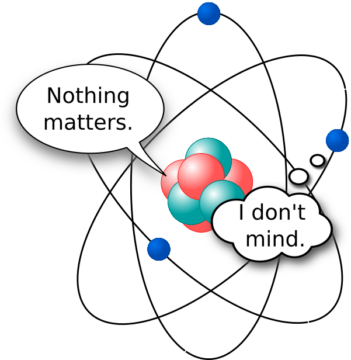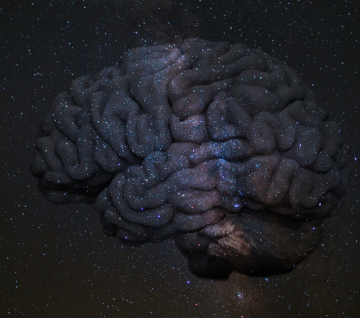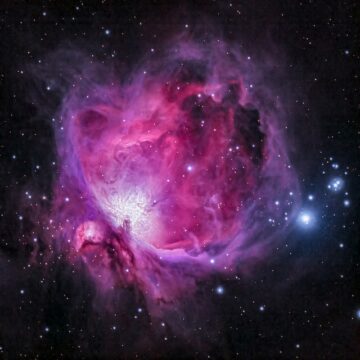by Jochen Szangolies

I’m inherently suspicious of overt declarations of having arrived at a certain position only through the strength of the arguments in its favor, even against one’s own prior commitments. If that were typically how things happen, then either there ought to be much more agreement than there is, or the vast majority of people are just irredeemably irrational.
There are several junctures in Philip Goff’s most recent book, Why? The Purpose of the Universe, at which we are treated to a description of the author’s intellectual journey, detailing how the force of argument necessitated course corrections. Now, changing your mind in the face of new information is generally a good thing: nobody gets it right on the first try, so everybody who’s held fast to their views probably just hasn’t examined them deeply. But still, very few people arrive at their position solely thanks to rational forces.
Luckily, most of the arguments in Goff’s book really are good ones. And what’s more, they’re presented in a way that’s accessible, without overly sacrificing detail, which he achieves by presenting them in a first pass, and then including a ‘Digging Deeper’-section devoted to clarifying various points and defending against some possible objections. That way, you can first get the gist, and perhaps return later to engage with the subject more deeply. Would that more philosophers, when writing for a non-specialist audience, showed that much consideration towards their audience!
Goff’s main contention is that the best available evidence, filtered through the understanding bestowed to us by our best current theories, does not paint a picture of a meaningless cosmos, as is usually claimed. (In the words of physicist Steven Weinberg, in his account of the creation of the universe, The First Three Minutes: “The more the universe seems comprehensible, the more it also seems pointless.”) That may have been true in the days of the mechanical cosmos of Laplace, but, Goff holds, is no longer the case.
He marshals two main arguments in support of his conclusion. One is the fact that the universe seems implausibly fine-tuned: that is, the parameters that define its properties fall within a very narrow range that allow for the existence of complex structures, and hence, life. The other and, to me, more compelling one is sometimes known as the Darwinian argument against materialism: since natural selection is only sensitive to behaviors, there is nothing that compels our internal states to track the affective valence of our stimuli—that is, evolution doesn’t need pain to feel bad, it just needs us to avoid it. So where does this psycho-physical harmony, as Goff calls it, come from?
I will take a deeper look at each of these arguments in turn, starting in this column with the fine-tuning argument. Rather than a review of Goff’s book, however, I’ll take his arguments as a sounding board for some of my own views, hopefully sharpening them somewhat. If you’re looking for a review, I’ll just offer: it’s really good, go buy it if it sounds at all interesting to you.
Jiggling The Knobs

Suppose you’re in the market for a new house. There’ll be some list of desiderata that your dream home should fulfill: perhaps you want a large garden, a pool, an open floor plan, a temperate cellar for your wine collection, for the whole thing to be situated near your work, a kindergarten, and some shopping opportunities—and all at a reasonable price, of course. Suppose you communicate your desires to a real estate agent—and the very first house they show you fits them to a T. You’ll hardly be able to believe your luck! Moreover, you conclude that the agent must be excellent at their job, finding you a home perfectly suited to your needs.
Now, take that times a few billion, and you’ll have the situation we’re in with our universe. According to our best current theories, the characteristics of the universe are governed by a certain set of free parameters, that is, constants whose values the theory doesn’t settle—they’re the ‘input’ to the universe. Alter them, and, like altering the mix of ingredients for your cookie dough, what comes out might be radically unlike what you want.
What’s striking about this is that it seems like just about any alteration would yield a cosmos radically inhospitable to creatures such as us—indeed, one in which there no stable atoms form, or stars can’t sustain fusion, so that virtually nothing, or nothing of any significant complexity at least, exists at all.
This argument is usually put to work as evidence of design in the universe, and thus, as evidence of a designer—that is, God. Goff doesn’t think much of that hypothesis, noting that it fits ill with the sort of world we see—if there is an all-powerful, all-knowing, all-good entity that’s created all this, then well, there’s some explanation needed as to why it, frankly, is a bit shit at times.
Now, many such justifications—theodicies if you want to get fancy about it—have, of course, been put forward. Goff doesn’t think them convincing, but moreover, he thinks that we can do more with less—reap the same explanatory benefit with less metaphysical extravagance. To that end, he formulates the Value-Selection Hypothesis, stipulating that these free parameters take the values they do in order to yield a universe containing things of significant value—like complex life, for instance.
This commits him to a position of value realism—values, facts about things being good or bad, are elements of the basic furniture of the universe. (To be fair, he introduces independent arguments for this position that I can’t review here in full.) This is an instance of a trend in his argumentation that I find somewhat worrying—whenever something seems incapable of further elucidation, it’s just tacked on to the inventory of the cosmos. Perhaps this is a natural reaction to the trend in much of the 20th century to just chuck out these troublesome notions wholesale, calling them ‘illusions’ or ‘pseudoproblems’, and trying to make do with whatever austere metaphysics (if any!) is left over. But I’m not sure that, as explanations go, much is won in such a move: it seems like any why introduced in such a way is in want of a how.
Goff then notes that it needn’t be God that tunes numbers to their value-optimal settings. Besides various ‘non-standard’ designers (beings differing from God along any of the three ‘omni’-axes, such as, for instance, the architect of a cosmic simulation), he introduces the options of teleological laws and cosmopsychism. Teleological laws are laws that have an end-point built into them: that shape the evolution of the universe such as to eventually yield a certain end point. Again it’s not clear, to me, that this adds much in terms of explanatory value. Either these laws are just brute facts, and we’re not allowed to ask ‘why’—but then, why not just afford the constants of the cosmos the same status. Or, they must be explained in terms of some further facts—but then, we just iterate the problem. Otherwise, we have gotten tangled up in circularity somewhere. (This is of course nothing but the Münchhausen trilemma again.)
Mind Under Matter

That leaves the option of cosmopsychism: ascribing mentality, consciousness, to the universe itself. This is a particular variant of panpsychism, the view, long championed by Goff, that there’s some degree of consciousness inherent in every bit of matter—but writ large, with a unified sort of conscious experience associated with the totality of all things. (Panpsychism, itself a controversial view, is often subject to misguided attacks; for a defense against some of them that stops just short of endorsing it, see here.)
On this view, it is the universe itself that strives to maximize value—and thus, complex life. However, in doing so, it is subject to constraints—known to us as ‘laws of physics’—which explains its imperfect nature. Thus, we have an explanation of fine-tuning, without needing to either postulate a built-in drive towards value, or succumbing to the problem of evil—the best of both worlds, it seems.
But is that really true? First of all, we’re at least skirting dangerously close to circularity—the third horn of the Münchhausen trilemma—if we’re having the universe shape itself according to its own design. Moreover, though, for the universe to not just be aware of its own nature, but also, to influence it towards the maximization of value, it must be capable of acting accordingly—that is, more than just consciousness, it also needs agency. This ties in with what may be Goff’s boldest move in a book that doesn’t shy away from embracing even counterintuitive consequences: extending panpsychism to pan-agentialism, the view that agency is built into matter at every level.
Does the question of why a couple of numbers have the values they do really compel such a picture? I’m not convinced. First of all, it’s not clear to me that there’s really much of a problem there—we are reasoning from a picture of physics we have strong grounds to believe incomplete at best. If the original ambition of string theory had come to fruition, all of these numbers might have received an explanation in terms of just a single parameter, the string tension, which at least considerably reduces the problem manifold. Now, even with this hope having been dashed—there are, according to some estimates, some 10500 ways of setting the constants of the universe thanks to the different ways to compactify string theory’s extra dimensions—it is not clear that a hypothetical completed physics couldn’t account for a great deal of the apparent variability in the constants.
Moreover, I think Goff gives somewhat short shrift to alternative explanations for fine tuning. First, he argues that the common ‘multiverse’-type of explanation is just an instance of the inverse gambler’s fallacy: observing an unlikely outcome and assuming it must be due to a great number of sampling instances. I’m not sure this argument works (without wanting to endorse a multiverse). After all, our ability of observing anything at all is tied to the outcome of the sampling process: we can only ever see the ‘unlikely’ outcome of getting the numbers just right. So we’re not sampling fairly from the underlying distribution.
Goff defends against this by presenting an analogy where you are about to observe a dice roll in a casino, but will be killed by a sniper if that roll isn’t incredibly unlikely. Thus, you could only observe an incredibly unlikely outcome (or nothing). But this, even if you observe anything, manifestly doesn’t allow you to infer that there must have been many people rolling dice that day.
I don’t think this analogy works: the sample space is still the set of all dice rolls; but not all universes among the multiverse are even in principle observable. So take the following analogy: you’re the house detective of a casino, and are tasked with investigating possible cheating whenever somebody seems to have a very lucky streak. Suppose you’re called in, and (having convinced yourself of the absence of foul play) pronounce that there must be very many people playing that night: you’re warranted to make that argument by the fact that typically, you’ll simply be right—you’re called in on busy nights much more often than on slow ones (provided, again, no cheating is going on).
Now, it may be the case that this doesn’t allow us to conclude the existence of a multiverse from the observation of fine-tuning alone; but it does make a case that if there is a multiverse, then fine-tuning should not be surprising. So if we take ourselves to have independent grounds for belief in the existence of a multiverse, then the fine-tuning issue seems to dissolve.
Furthermore, there are other possible explanations that don’t invoke purpose or design. One is to parallel the strategy that obviates this need in the case of biological organisms: appeal to a selection effect, as in the theory of cosmological natural selection. Universes could be born from ‘mother’-universes, say within the latter’s black holes; then, universes with many black holes (‘fecund’ universes) would be more common than ‘barren’ ones, and many of the parameters that seem to favor structures of high complexity also appear to increase black hole formation. (Which incidentally raises another doubt for the alignment of the universe’s purpose with the emergence of life Goff proposes: perhaps it’s rather the number of black holes that is being maximized, with complex structures just being a side-effect.)

Other options also exist, such as the ‘participatory anthropic principle’, which posits that the universe is necessarily such as to bring complex life into existence because observation—or acts of ‘observer participancy’—are necessary to bring the universe into being in the first place. Along somewhat similar lines, philosopher of science Michael Esfeld, in Science and Human Freedom, has defended an account of free will in which the constants of the universe are not initially fully specified, but offer some ‘leeway’ which is gradually filled in by free decisions, leading to their ultimate determination only at the endpoint of the universe’s evolution.
My own thoughts lie in a similar direction. I take the fine-tuning issue to be, essentially, an indication of trouble with the standard Western metaphysical assumption of the subject-object split. There’s a world, independent of us, out there, and we have evolved in this world. The world could have existed without us, and if we look at the huge number of possibilities that it might have, our existence is nothing short of miraculous—hence, we appeal to some sort of miracle to explain it.

But—and here’s perhaps my favorite thought experiment again—try to think of a world without any observers. Whatever you’ve come up with—planets careening through the void of space, deserts unmarred by human touch, or even unspoiled forests as far as the eye can see—you’re wrong: you have imagined it in the only possible way, from within a certain perspective. Thus, when we talk about ‘the world’, we really talk about perspectives on the world; and our theories of the world are then likewise theories of such perspectives. But then, there is no miracle at all to the fact that our theories are such as to presuppose the existence of such a perspective!
Goff feels moved to attributing consciousness, and agency, to the outside world by what I view to be an illicit generalization: going beyond the collection of perspectives on the world and adding them up to an external world standing on its own (having ‘substance’ of its own), only to then find he has to add perspective and agency back in to make sense of things. I say, cut out the middle man: there are only those individual perspectives, but no all-encompassing container reality that encompasses them (in fact, as argued previously, quantum mechanical considerations like the Kochen-Specker theorem and the Frauchiger-Renner argument seem to speak strongly against such a view).
Creation, then, is not the work of an independently conscious universe, but the totality of acts of observer participancy. This runs into an obvious issue: why isn’t the world the way you would prefer it, if your acts of creation are what constitutes it? There lurks an abhorrent conclusion just below the surface here, a sort of ‘little’ problem of evil, that must be ameliorated: if the universe is, to some extent, due to your own design, even if perhaps unconsciously, then you are responsible for all the bad things that happen to you. This is the putrid heart of many ‘self-help’ programs, that appeal to a ‘law of attraction’, or teach you to ‘manifest your desires’, and whatnot, such as the Oprah Winfrey-endorsed ‘The Secret’. It takes just a cursory look at the world to realize that this stance is, in fact, nothing short of monstrous: whenever bad things happen to good people, either they have not sufficiently manifested the good, or actively attracted the bad—in short, they are responsible for their own misfortune. This is the ultimate form of victim blaming, and any stance hinting towards such a conclusion deserves little more than scorn.
But even if the universe is created in acts of observer participancy, this doesn’t entail that it is only your acts that dictate your fortune. Every perspective is bounded by the perspectives of others, and includes a perspective on others; everyone’s freedom is limited by that of everyone else. We are all, in Goff’s terms, ‘limited designers’—very limited: constrained by natural law, and the design of everybody else (which might turn out not to be entirely distinct).
Still, it doesn’t really feel like we’re creating the universe with our actions. Rather, it seems that the universe is already there, and we just act within it as best we can. The solution to this, I believe, lies in the notion that we, as individual loci of creation, are not necessarily personally identical with us as human beings, but our experience is the self-experience of such a locus. Our agency may be different in the sense that our actions are not primarily acts of creation, but these acts of creation form preconditions to our agency. Elucidation of what this means, however, must wait for part II of this not-quite-review, where I consider Goff’s second, much more intriguing argument—namely, that without purpose in the basic makeup of the world, the psycho-physical harmony between our experience and the actions we take is nothing short of miraculous.
